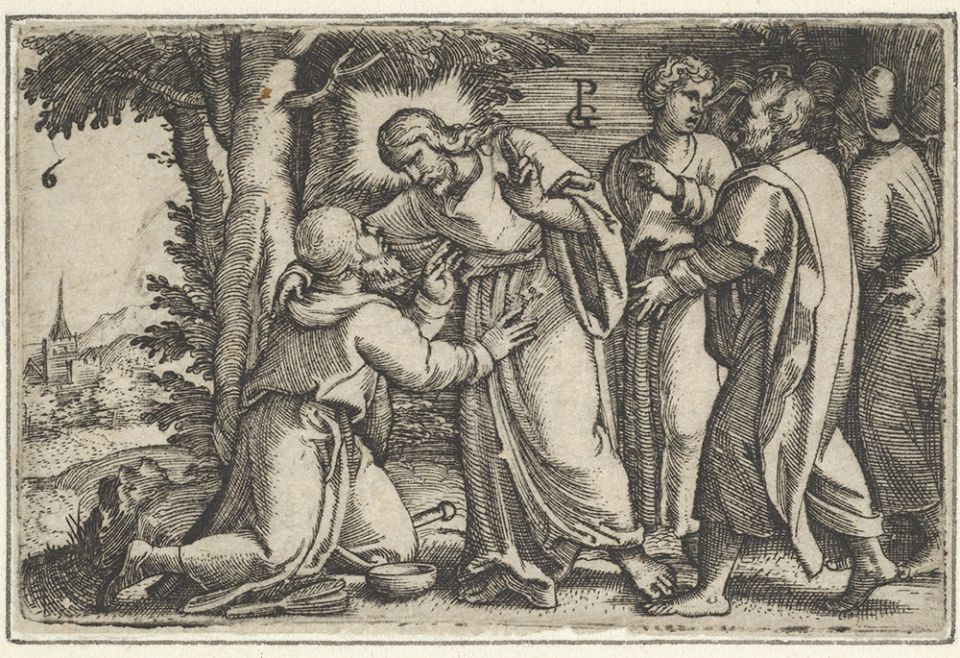DP855485.jpg

We know this story only too well. Jesus healed 10 lepers. One, a Samaritan, came back to thank him. It's all about gratitude, right? Listen again, it's not quite that simple. When the Samaritan returned, Jesus, like a shepherd worried about the nine on the road instead of the one in front of him, asks, "Where are the others?" The answer is that they were doing exactly what Jesus told them to do. They were going to show themselves to the priest.
It's an odd story. Ten lepers, guarding the proper distance from healthy people, asked Jesus for mercy. They didn't specify what mercy meant. Was that their normal cry to any passersby? Were they asking for food, or alms, or did they think he could heal them? Did they know who Jesus was? Without touching or even coming near them, Jesus sent them to show themselves to the priest. Mysteriously, without any additional action on Jesus' part, without any other words or action, "as they were going, they were cleansed."
Considering it carefully, it seems that their cure came not from a touch or a word, but from obedience — which is a kind of faith. Their journey toward fulfilling the law brought them healing. Only one of them discerned something more. The other nine seem to be ordinary religious people, doing what they were told to do. Certainly, they were happy, but we know nothing more about them, not even if they were Jews or Samaritans.
Then there was the one. This Samaritan realized that he was offered more than a cure. He had not only received the mercy he had requested, but he discerned that something more was in the offering. Instead of going to the priest, he returned like someone crazed with delight, shouting God's praises. And what did Jesus do? Instead of dancing with him, Jesus asked, "What about the rest?" Was he honestly wondering what had happened to them? He said, "Ten were cleansed, were they not?" Was that a statement or a question?
Was Jesus lamenting that the deeper message, the mustard seed, reign-of-God grace, had reached only one of the group? Did he see one out of 10 as the poor grade his ministry was earning at that point? Did he find it hard to rejoice over the one who understood what he offered while the rest would just go on living a normal life?
Advertisement
Advertisement
Finally, Jesus bent over the healed believer at his feet and said, "Rise up. Your faith has saved you."
As Luke tells this story, three distinct things happened to the various lepers. First, as they went to the priest, they all were cleansed, that is, the signs their disease disappeared. Secondly, one realized that he had been "healed," another way of saying he had been "made whole." Finally, Jesus tells the one, your faith has saved you, a word which has more religious than physical connotations.
The man who was saved fell at Jesus' feet, singing loud praises, demonstrating that he recognized God acting through Jesus. This man had already received more than a simple cure. Like Naaman the Syrian, whose healing in the waters of the Jordan led him to worship the God of Israel, this one had undergone a metanoia, a revelation had changed his life. In the words of Pope Francis, he had encountered the joy of the Gospel which, "fills the hearts and lives of all who encounter Jesus. Those who accept his offer of salvation are set free from sin, sorrow, inner emptiness and loneliness." He had learned that "with Christ joy is constantly born anew" (Evangelii Gaudium, 1).
That this story encourages us to give thanks to God is a very good thing, but that moral sells the story short. Ten people with leprosy asked to be cleansed. Nine received their health and presumably returned rejoicing to the life from which they had been cut off. The 10th man somehow realized that there was more available than he had imagined. He was more than restored; his interaction with Jesus brought him into God's healing presence, the joy of the Gospel.
This incident, told as a story, becomes a parable about prayer. We can ask for what we need and rejoice when we receive it. We can live as ordinary religious people, grateful for what we have. Or, taking Naaman and this believer as our patrons, we can make the subtext of every prayer a plea that we may recognize and be ready to receive the joy God wants to give us. As St. Paul assures us, we are constantly being offered more than we could ask or imagine. That's the breadth of the mercy of God.



